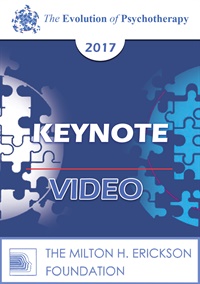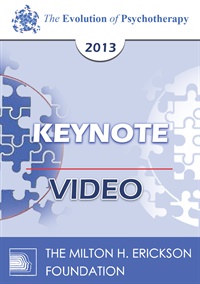Credit available - Click Here for more information
- Average Rating:
- Not yet rated
- Topic Areas:
- Keynotes | Cognitive Behavior Therapy (CBT) | Psychotherapy
- Bundle(s):
- Learning Track - EP17 CBT Stream
- Categories:
- Evolution of Psychotherapy | Evolution of Psychotherapy 2017 | Evolution of Psychotherapy CBT Learning Track | Online Continuing Education
- Faculty:
- Aaron Beck, MD | Judith Beck, PhD
- Course Levels:
- Master Degree or Higher in Health-Related Field
- Duration:
- 56:33
- Format:
- Audio and Video
- Original Program Date:
- Dec 16, 2017
- Short Description:
- A deeply human look at cognitive therapy with people diagnosed with schizophrenia and other severe mental illnesses. Participants learn how recovery-oriented cognitive therapy builds engagement through relationship, shared activity, and attention to personal aspirations rather than symptom confrontation. Through vivid clinical examples, the session shows how delusions, withdrawal, and hopelessness can soften when therapy centers dignity, meaning, and real-world connection, alongside medication when appropriate.
- Price:
-
Sale is $29.00
price reduced from Base Price - $59.00
Credit available - Click Here for more information
- Average Rating:
- Not yet rated
- Topic Areas:
- Great Debates | Cognitive Behavior Therapy (CBT) | Experiential Therapy | Psychotherapy
- Bundle(s):
- Learning Track - EP17 CBT Stream | Learning Track - EP17 Erickson Stream
- Categories:
- Evolution of Psychotherapy | Evolution of Psychotherapy 2017 | Evolution of Psychotherapy CBT Learning Track | Evolution of Psychotherapy Erickson Learning Track | Online Continuing Education
- Faculty:
- Stephen Gilligan, PhD | Donald Meichenbaum, PhD
- Course Levels:
- Master Degree or Higher in Health-Related Field
- Duration:
- 1:19:30
- Format:
- Audio and Video
- Original Program Date:
- Dec 14, 2017
- Short Description:
- This exchange will focus on the classic question of whether good therapy should focus more on cognitive or experiential changes. The merits of each, and the possibility of a “both/and” partnership, are considered.
- Price:
-
Sale is $29.00
price reduced from Base Price - $59.00
- Average Rating:
- Not yet rated
- Topic Areas:
- Keynotes | Psychotherapy | Cognitive Behavior Therapy (CBT) | History of Psychotherapy
- Categories:
- Evolution of Psychotherapy | Evolution of Psychotherapy 2013
- Faculty:
- Aaron Beck, MD
- Course Levels:
- Master Degree or Higher in Health-Related Field
- Duration:
- 1:02:55
- Format:
- Audio and Video
- Original Program Date:
- Dec 15, 2013
- Short Description:
- The discussion will center on the evolution of the cognitive model of psychopathology and psychotherapy since its earlier stage. The expansion of therapy has included all of the common disorders and many of the medically related disorders will be explored. Finally, we will focus on the future of cognitive therapy and psychotherapy in general. Special attention will be paid to the relationship of other psychotherapies.
- Price:
-
Sale is $29.00
price reduced from Base Price - $59.00
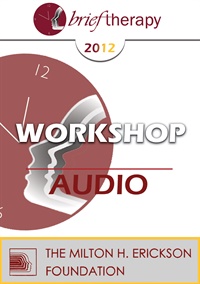
- Average Rating:
- Not yet rated
- Topic Areas:
- Cognitive Behavior Therapy (CBT) | Couples Therapy | Workshops
- Categories:
- Brief Therapy Conference | Brief Therapy Conference 2012
- Faculty:
- Frank Dattilio, PhD, ABPP
- Duration:
- 2:48:16
- Format:
- Audio Only
- Original Program Date:
- Dec 08, 2012
- Short Description:
- BT12 Workshop 34 – Cognitive-Behavioral Techniques with Couples – Frank Dattilio, PhD, ABPP This workshop focuses on the specific use of cognitive-behavioral strategies as an adjunct to the many treatment modalities of couples’ therapy. It offers a basic overview of the theories of cognitive-behavioral therapy, particularly as it applies to couples. Participants will learn firsthand techniques and strategies for working with difficult couples and how to integrate these strategies with their respective modes of treatment. The presentation is followed by a videotape that demonstrates the implementation of techniques and interventions.
- Price:
- $15.00 - Base Price
- Average Rating:
- Not yet rated
- Topic Areas:
- Cognitive Behavior Therapy (CBT) | Clinical Demonstrations | Storytelling | Constructive Narrative | Psychotherapy | Brief Therapy
- Categories:
- Brief Therapy Conference | Brief Therapy Conference 2010
- Faculty:
- Donald Meichenbaum, PhD
- Duration:
- 56:53
- Format:
- Audio Only
- Original Program Date:
- Dec 11, 2010
- Short Description:
- This presentation will demonstrate the heuristic value of using a Case Conceptualization Model to inform assessment and treatment decision- making ; the "art of Socratic questioning; a strength-based treatment approach and ways to implement the Core Tasks of psychotherapy. A Constructive Narrative treatment approach that focuses on the nature of the client's "story-telling" features will be highlighted.
- Price:
- $15.00 - Base Price
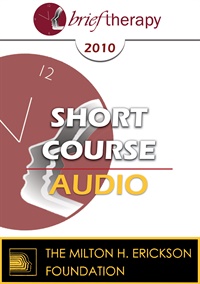
- Average Rating:
- Not yet rated
- Topic Areas:
- Cognitive Behavior Therapy (CBT) | Psychotherapy | Short Courses | Humor | Brief Therapy
- Categories:
- Brief Therapy Conference | Brief Therapy Conference 2010
- Faculty:
- Steve Sultanoff | Steven Sultanoff, Psychologist
- Duration:
- 1:26:25
- Format:
- Audio Only
- Original Program Date:
- Dec 09, 2010
- Short Description:
- Humor in the serious realm of psychotherapy? This lively presentation, filled with anecdotes and clinical illustrations, will explore the rationale for and practical application of humor in cognitive therapy. Both cognitive therapy and humor can create change in the central aspects of human experience—cognitions, emotions, behaviors, and physiology. The presenter will explore how humor can be a powerful tool for both diagnosis and treatment, and will differentiate between empathic and hostile styles of humor. With Steven Sultanoff.
- Price:
- $15.00 - Base Price
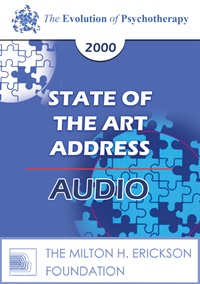
- Average Rating:
- Not yet rated
- Topic Areas:
- State of the Art Address | Belief Systems | Psychotherapy | Therapist Development
- Categories:
- Evolution of Psychotherapy | Evolution of Psychotherapy 2000
- Faculty:
- Albert Bandura
- Duration:
- 51 Minutes
- Format:
- Audio Only
- Original Program Date:
- May 27, 2000
- Short Description:
- This session offers a far-reaching look at self-efficacy as a core driver of motivation, resilience, and change. Drawing on decades of research and applied examples, it shows how beliefs about personal and collective agency shape learning, emotional health, behavior change, and social action, from anxiety and depression to health habits and community-level outcomes. The talk gives therapists and students a practical framework for understanding why confidence, mastery, and perceived control matter so deeply in both clinical work and everyday life.
- Price:
- $15.00 - Base Price
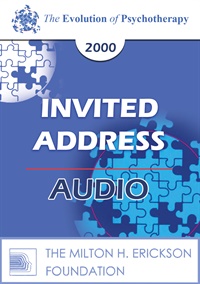
- Average Rating:
- Not yet rated
- Topic Areas:
- Invited Addresses | Cognitive Behavior Therapy (CBT) | Schizophrenia
- Categories:
- Evolution of Psychotherapy | Evolution of Psychotherapy 2000
- Faculty:
- Aaron Beck, MD | Miriam Polster
- Duration:
- 1 Hour 26 Minutes
- Format:
- Audio Only
- Original Program Date:
- May 26, 2000
- Short Description:
- There have been some surprising developments in cognitive approaches to schizophrenia in recent years. Dr. Beck will describe the clinical trials, some of the therapeutic strategies used to modify, if not eliminate, delusions and hallucinations, and a cognitive model for understanding paranoid psychosis. This understanding will enable therapists to add substantially to the improvement provided by medication.
- Price:
- $15.00 - Base Price
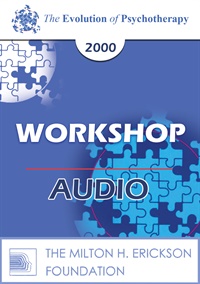
- Average Rating:
- Not yet rated
- Topic Areas:
- Cognitive Behavior Therapy (CBT) | Workshops | Personality Disorders | Psychotherapy
- Categories:
- Evolution of Psychotherapy | Evolution of Psychotherapy 2000
- Faculty:
- Judith Beck, PhD | Aaron Beck, MD
- Duration:
- 2 Hours 40 Minutes
- Format:
- Audio Only
- Original Program Date:
- May 25, 2000
- Short Description:
- Cognitive therapy can be adapted for people with severe and persistent mental disorders, including psychosis, chronic depression, and complex comorbidity. Participants in this workshop learn how therapists work collaboratively with delusions, hallucinations, and entrenched beliefs without confrontation, while building hope, structure, and day-to-day coping skills. The session offers a grounded view of cognitive therapy as flexible, humane, and practical, showing how careful formulation and relationship make meaningful change possible even in high-severity cases.
- Price:
- $15.00 - Base Price
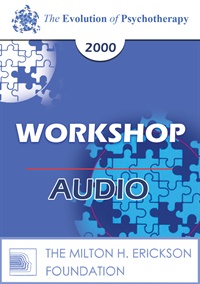
- Average Rating:
- Not yet rated
- Topic Areas:
- Ericksonian Psychotherapy | Neuroscience | Workshops | Ericksonian Hypnosis and Therapy Techniques | Psychotherapy
- Categories:
- Evolution of Psychotherapy | Evolution of Psychotherapy 2000
- Faculty:
- Ernest Rossi, PhD
- Duration:
- 2 Hours 33 Minutes
- Format:
- Audio Only
- Original Program Date:
- May 25, 2000
- Short Description:
- Neuroscientists have proposed that the next ten years be devoted to exploring cognitive approaches to facilitating neurogenesis in the hippocampus of the adult human brain. Let's do it!
- Price:
- $15.00 - Base Price


